FOREIGN FIELDS Only the brave send reefers across the Channel — Tim Maughan talks to the British elite who
Page 53
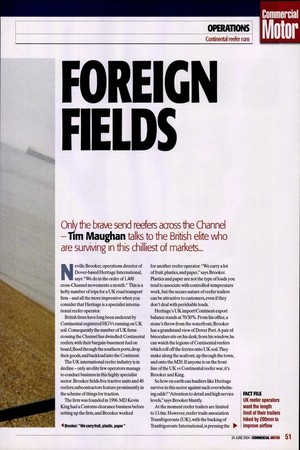
Page 54
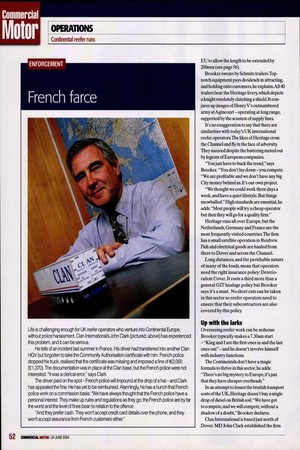
Page 55
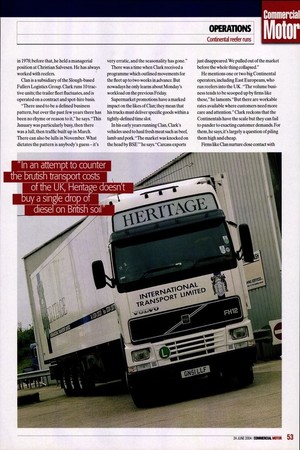
Page 56
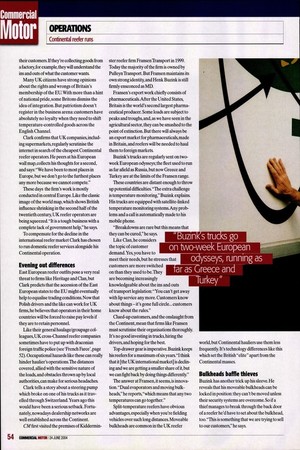
Page 57
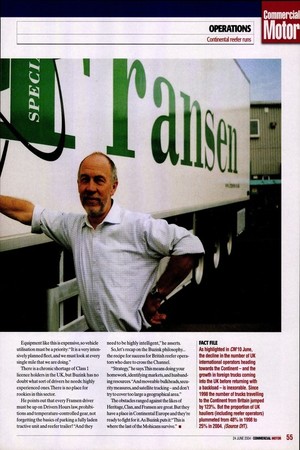
If you've noticed an error in this article please click here to report it so we can fix it.
are surviving in this chilliest of markets...
Neville Brooker, operations director of Dover-based Heritage International, says: "We do in the order of 1,400 cross-Channel movements a month." This is a hefty number of trips for a UK road transport firm — and all the more impressive when you consider that Heritage is a specialist international reefer operator.
Neville Brooker, operations director of Dover-based Heritage International, says: "We do in the order of 1,400 cross-Channel movements a month." This is a hefty number of trips for a UK road transport firm — and all the more impressive when you consider that Heritage is a specialist international reefer operator.
Neville Brooker, operations director of Dover-based Heritage International, says: "We do in the order of 1,400 cross-Channel movements a month." This is a hefty number of trips for a UK road transport firm — and all the more impressive when you consider that Heritage is a specialist international reefer operator.
British firms have long been undercut by Continental-registered HGVs running on UK soil. Consequently the number of UK firms crossing the Channel has dwindled: Continental reefers, with their bargain-basement fuel on board, flood through the southern ports, drop their goods, and backload into the Continent.
The UK international reefer industry is in decline — only an elite few operators manage to conduct business in this highly specialist sector. Brooker fields five tractive units and 40 reefers; subcontractors feature prominently in the scheme of things for traction. The firm was founded in 1996. MD Kevin King had a Customs clearance business before setting up the firm, and Brooker worked
for another reefer operator. "We carry a lot of fruit, plastics, and paper," says Brooker. Plastics and paper are not the type of loads you tend to associate with controlled-temperature work, but the secure nature of reefer trailers can be attractive to customers, even if they don't deal with perishable loads.
Heritage's UK import/Continent export balance stands at 70/30%. From his office, a stone's throw from the waterfront, Brooker has a grandstand view of Dover Port.A pair of binoculars sits on his desk; from his window, he can watch the legions of Continental reefers which roll off the ferries onto UK soil.They snake along the seafront, up through the town, and onto the M20. If anyone is on the front line of the UK vs Continental reefer war, it's Brooker and King.
So how on earth can hauliers like Heritage survive in this sector against such overwhelming odds? "Attention to detail and high service levels," says Brooker bluntly. At the moment reefer trailers are limited to 13.6m. However, reefer trade association Transfrigoroute (UK), with the backing of Tranfrigoroute International, is pressing the O•
EU to allow the length to be extended by 200mm (seepage 56).
Brooker swears by Schmitz trailers. Topnotch equipment pays dividends in attracting, and holding onto customers, he explains. All 40 trailers bear the Heritage livery, which depicts a knight resolutely clutching a shield. It conjures up images of Henry V's outnumbered army at Agincourt — operating at long range, supported by the scantest of supply lines.
It's no exaggeration to say that there are similarities with today's UK international reefer operators.The likes of Heritage cross the Channel and fly in the face of adversity. They succeed despite the battering meted out by legions of European companies.
"You just have to buck the trend," says Brooker. "You don't lay down— you compete. "We are profitable and we don't have any big City money behind us. It's our own project.
"We thought we could work three days a week, and have a quiet lifestyle. But things snowballed." High standards are essential, he adds: "Most people will try a cheap operator but then they will go for a quality firm."
Heritage runs all over Europe, but the Netherlands, Germany and France are the most frequently visited countries. The firm has a small satellite operation in Renfrew. Fish and electrical goods are hauled from there to Dover and across the Channel.
Long distances, and the perishable nature of many of the loads, mean that operators need the right insurance policy: Deterioration Cover. It costs a third more than a general GIT haulage policy but Brooker says it's a must. No short cuts can be taken in this sector so reefer operators need to ensure that their subcontractors are also covered by this policy. Up with the larks
Overseeing reefer work can be arduous: Brooker typically makes a 7.30am start —"King and I are the first ones in and the last ones out" — and he doesn't involve himself with industry functions.
The Continentals don't have a magic formula to thrive in this sector, he adds: "There's no big mystery to Europe, it's just that they have cheaper overheads."
In an attempt to lessen the brutish transport costs of the UK, Heritage doesn't buy a single drop of diesel on British soil."We have got to compete, and we will compete, without a shadow of a doubt," Brooker declares. Clan International is based just north of Dover. MD John Clark established the firm
in 1978; before that, he held a managerial position at Christian Salvesen. He has always worked with reefers.
Clan is a subsidiary of the Slough-based Fullers Logistics Group. Clark runs 10 tractive units; the trailer fleet fluctuates, and is operated on a contract and spot-hire basis. "There used to be a defined business pattern, but over the past few years there has been no rhyme or reason to it," he says. "This January was particularly busy, then there was a lull, then traffic built up in March. There can also be lulls in November. What dictates the pattern is anybody's guess — it's
very erratic, and the seasonality has gone."
There was a time when Clark received a programme which outlined movements for the fleet up to two weeks in advance. But nowadays he only learns about Monday's workload on the previous Friday.
Supermarket promotions have a marked impact on the likes of Clan; they mean that his trucks must deliver specific goods within a tightly-defined time slot. In his early years running Clan, Clark's vehicles used to haul fresh meat such as beef, lamb and pork. "The market was knocked on the head by BSE" he says. "Carcass exports
just disappeared. We pulled out of the market before the whole thing collapsed."
He mentions one or two big Continental operators, including East Europeans, who run reefers into the UK . "The volume business tends to be scooped up by firms like these," he laments. "But there are workable rates available where customers need more care and attention." Clark reckons that the Continentals have the scale but they can fail to pander to exacting customer demands. For them, he says, it's largely a question of piling them high and cheap. Finns like Clan nurture close contact with
their customers. If they're collecting goods from a factory, for example, they will understand the ins and outs of what the customer wants.
Many UK citizens have strong opinions about the rights and wrongs of Britain's membership of the EU. With more than a hint of national pride, some Britons dismiss the idea of integration. But patriotism doesn't register in the business arena: customers have absolutely no loyalty when they need to shift temperature-controlled goods across the English Channel.
Clark confirms that UK companies, including supermarkets, regularly scrutinise the internet in search of the cheapest Continental reefer operators. He peers at his European wall map, collects his thoughts for a second, and says: "We have been to most places in Europe, but we don't go to the furthest places any more because we cannot compete."
These days the firm's work is mostly conducted in central Europe. Like the classic image of the world map, which shows British influence shrinking in the second half of the twentieth century, UK reefer operators are being squeezed. "It is a tough business with a complete lack of government help," he says.
To compensate for the decline in the international reefer market Clark has chosen to run domestic reefer services alongside his Continental operation. Evening out differences
East European reefer outfits pose a very real threat to firms like Heritage and Clan, but Clark predicts that the accession of the East European states to the EU might eventually help to equalise trading conditions. Now that Polish drivers and the like can work for UK firms, he believes that operators in their home countries will be forced to raise pay levels if they are to retain personnel.
Like their general haulage/groupage colleagues,UK cross-Channel reefer companies sometimes have to put up with draconian foreign traffic police (see 'French Farce', page 52). Occupational hazards like these can really hinder haulier's operations.The distances covered, allied with the sensitive nature of the loads, and obstacles thrown up by local authorities, can make for serious headaches.
Clark tells a story about a steering pump which broke on one of his trucks as it travelled through Switzerland.Years ago this would have been a serious setback. Fortunately, nowadays dealership networks are well established across the Continent. CM first visited the premises of Kiddennin
ster reefer firm FransenTransport in 1999. Today the majority of the firm is owned by Pulleyn Transport. But Fransen maintains its own strong identity, and Henk Buzink is still firmly ensconced as MD.
Fransen's export work chiefly consists of phannaceuticals.After the United States, Britain is the world's second largest pharmaceutical producer. Some loads are subject to peaks and troughs, and, as we have seen in the agricultural sector, they can be smashed to the point of extinction. But there will always be an export market for pharmaceuticals, made in Britain, and reefers will be needed to haul them to foreign markets.
Buzink's trucks are regularly sent on twoweek European odysseys; the fleet used to run as far afield as Russia, but now Greece and Turkey are at the limits of the Fransen range.
These countries are distant enough to throw up potential difficulties. "The extra challenge is temperature monitoring," Buzink explains. His trucks are equipped with satellite-linked temperature monitoring systems.Any problems and a call is automatically made to his mobile phone.
"Breakdowns are rare but this means that they can be cured," he says.
"Breakdowns are rare but this means that they can be cured," he says.
Like Clan, he considers the topic of customer demand.Yes, you have to meet their needs, but he stresses that customers are more switched on than they used to be. They are becoming increasingly knowledgeable about the ins and outs of transport legislation: "You can't get away with lip service anymore. Customers know about things — it's gone full circle.., customers know about the rules."
Like Clan, he considers the topic of customer demand.Yes, you have to meet their needs, but he stresses that customers are more switched on than they used to be. They are becoming increasingly knowledgeable about the ins and outs of transport legislation: "You can't get away with lip service anymore. Customers know about things — it's gone full circle.., customers know about the rules."
Like Clan, he considers the topic of customer demand.Yes, you have to meet their needs, but he stresses that customers are more switched on than they used to be. They are becoming increasingly knowledgeable about the ins and outs of transport legislation: "You can't get away with lip service anymore. Customers know about things — it's gone full circle.., customers know about the rules."
Like Clan, he considers the topic of customer demand.Yes, you have to meet their needs, but he stresses that customers are more switched on than they used to be. They are becoming increasingly knowledgeable about the ins and outs of transport legislation: "You can't get away with lip service anymore. Customers know about things — it's gone full circle.., customers know about the rules."
Like Clan, he considers the topic of customer demand.Yes, you have to meet their needs, but he stresses that customers are more switched on than they used to be. They are becoming increasingly knowledgeable about the ins and outs of transport legislation: "You can't get away with lip service anymore. Customers know about things — it's gone full circle.., customers know about the rules."
Like Clan, he considers the topic of customer demand.Yes, you have to meet their needs, but he stresses that customers are more switched on than they used to be. They are becoming increasingly knowledgeable about the ins and outs of transport legislation: "You can't get away with lip service anymore. Customers know about things — it's gone full circle.., customers know about the rules."
Clued-up customers, and the onslaught from the Continent, mean that finns like Fransen must scrutinise their organisations thoroughly. It's no good investing in trucks, hiring the drivers, and hoping for the best.
Top-drawer gear is imperative. Buzink keeps his reefers for a maximum of six years. "I think that it [the UK international market] is declining and we are getting a smaller share of it, but we can fight back by doing things differently."
The answer at Fransen, it seems, is innovation."Dual evaporators and moving bulkheads," he reports, "which means that any two temperatures can go together." Split-temperature reefers have obvious advantages, especially when you're fielding vehicles over such long distances. Moveable bulkheads are common in the UK reefer
world, but Continental hauliers use them less frequently. It's technology differences like this which set the British "elite" apart from the Continental masses. Bulkheads baffle thieves
Buzink has another trick up his sleeve. He reveals that his moveable bulkheads can be locked in position: they can't be moved unless their security systems are overcome. So if a thief manages to break through the back door of a reefer he'd have to set about the bulkhead, too."This is something that we are trying to sell to our customers," he says.
Equipment like this is expensive, so vehicle utilisation must be a priority:"It is a very intensively planned fleet, and we must look at every single mile that we are doing."
There is a chronic shortage of Class 1 licence holders in the UK, but Buzink has no doubt what sort of drivers he needs: highly experienced ones. There is no place for rookies in this sector. He points out that every Fransen driver must be up on Drivers Hours law, prohibitions and temperature-controlled gear, not forgetting the basics of parking a fully laden tractive unit and reefer trailer! "And they
need to be highly intelligent," he asserts.
So, let's recap on the Buzink philosophy... the recipe for success for British reefer operators who dare to cross the Channel.
"Strategy," he says.This means doing your homework, identifying markets, and husbanding resources."And moveable bulkheads,security measures, and satellite tracking— and don't try to cover too large a geographical area." The obstacles ranged against the likes of Heritage, Clan, and Fransen are great. But they have a place in Continental Europe and they're ready to fight for it.As Buzink puts it: "This is where the last of the Mohicans survive." • FACT FILE
As highlighted in CM10 June, the decline in the number of UK international operators heading towards the Continent — and the growth in foreign trucks coming into the UK before returning with a backload — is inexorable. Since 1998 the number of trucks travelling to the Continent from Britain jumped by 123%. But the proportion of UK hauliers (including reefer operators) plummeted from 48% in 1998 to 25% in 2004. (Source DfT).


































































































































































































